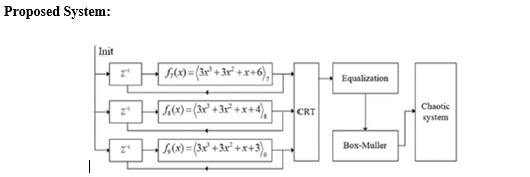A Residual Chaotic System for Image Security and Digital Video Watermarking
Objective
Here a general Residual Chaotic System (RCS) for image security in heterogeneous multimedia is implemented
Abstract
Multimedia data security has become a noticeable problem in the continuous development of multimedia technology. Traditional chaotic systems usually require larger bit-width iterative calculations to affect the generation rate of chaotic systems when generating. To solve this problem, we proposed a general Residual Chaotic System (RCS) for image security in heterogeneous multimedia signal processing environments.
Based on the Residue Number System (RNS) commonly used in VLSI, we generate the general chaotic sequences by iterating unary polynomial function through it in Galois Field (GF). Moreover, we make use of the Box-Muller algorithm to generate RCS, which improved the speed of operation by a large margin when doing R/B backward transformation.
Experiments show that the key sensitivity and plaintext sensitivity of the proposed encryption system are good, and the system can encrypt pictures efficiently and safely. Then, we proposed a watermark embedding and extraction algorithm with block selection. Based on the proposed new judgment conditions, the 4×4 brightness blocks are divided into five categories, then the appropriate types of blocks are selected accordingly.
After testing the performance indexes of cypher-text images, including statistical and sensitivity-related tests, all results indicate that our algorithm has good randomness and security. The invisibility is good, the watermark capacity has been significantly improved, and the video bit-rate growth rate is in a good range.
Keywords: Image encryption, residue number system (RNS), residual chaotic system (RCS), block selection, video watermark.
NOTE: Without the concern of our team, please don't submit to the college. This Abstract varies based on student requirements.
Block Diagram

Specifications
Software: Matlab 2020a or above
Hardware:
Operating Systems:
- Windows 10
- Windows 7 Service Pack 1
- Windows Server 2019
- Windows Server 2016
Processors:
Minimum: Any Intel or AMD x86-64 processor
Recommended: Any Intel or AMD x86-64 processor with four logical cores and AVX2 instruction set support
Disk:
Minimum: 2.9 GB of HDD space for MATLAB only, 5-8 GB for a typical installation
Recommended: An SSD is recommended A full installation of all MathWorks products may take up to 29 GB of disk space
RAM:
Minimum: 4 GB
Recommended: 8 GB
Learning Outcomes
- Introduction to Matlab
- What is EISPACK & LINPACK
- How to start with MATLAB
- About Matlab language
- Matlab coding skills
- About tools & libraries
- Application Program Interface in Matlab
- About Matlab desktop
- How to use Matlab editor to create M-Files
- Features of Matlab
- Basics on Matlab
- What is an Image/pixel?
- About image formats
- Introduction to Image Processing
- How digital image is formed
- Importing the image via image acquisition tools
- Analyzing and manipulation of image.
- Phases of image processing:
- Acquisition
- Image enhancement
- Image restoration
- Color image processing
- Image compression
- Morphological processing
- Segmentation etc.,
- About Artificial Intelligence (AI)
- About Machine Learning
- About Deep Learning
- About layers in AI (input, hidden and output layers)
- Building AI (ANN/CNN) architecture using Matlab
- We will able to know, what’s the term “Training” means in Artificial Intelligence
- About requirements that can influence the AI training process:
- Data
- Training data
- Validation data
- Testing data
- Hardware requirements to train network
- How to detect an object using AI
- How to extend our work to another real time applications
- Project development Skills
- Problem analyzing skills
- Problem solving skills
- Creativity and imaginary skills
- Programming skills
- Deployment
- Testing skills
- Debugging skills
- Project presentation skills
- Thesis writing skills





 Paper Publishing
Paper Publishing
